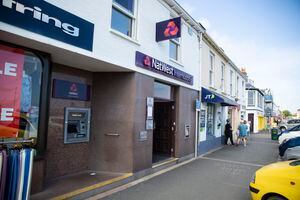Restructuring costs set out in report
A BANK that shut branches in Guernsey, Jersey and the Isle of Man has reported £34m. of restructuring costs related to property exits and redundancy costs.

The Royal Bank of Scotland International Ltd – which also trades as NatWest International – announced a string of NatWest branch closures in Guernsey, Jersey and the Isle of Man last year and said it was looking to reduce the headcount by 10% across the business, excluding Luxembourg, amid an acceleration of digital services.
The restructuring costs are set out in the bank’s recently-released report and accounts covering 2020, which also detailed a fall in operating profit and a jump in customer deposits as the Covid-19 pandemic hit the banking sector.
‘The bank has accelerated its digital transformation strategy in light of Covid-19 and is now meeting the increasing customer demand for digital solutions,’ said the document. ‘This change in customer behaviour has also led the bank to consolidate the branch network in local markets, reducing the branch network to eight in early January 2021.’
It reported operating expenses increasing by 20% to £272m. ‘Included in operating expense is £34m. of restructuring costs related to property exits and redundancy costs.’
Meanwhile, income decreased by 18% to £461m., reflecting the impact of central bank responses to Covid-19 as lower interest rates caused deposit margins to fall significantly. Loans and advances to customers fell by £0.9bn during the year to £13.3bn, while customer deposits increased by £1.1bn to £31.3bn.
The bank said it had worked closely with local governments to implement emergency policies to support local communities and businesses. It also said the pandemic had led to ‘a number of significant risk management challenges’.
‘The bank remained committed to supporting its customers while operating safely and soundly in line with its strategic objectives. Most notably, the credit risk profile was heightened as the bank provided payment holidays during the crisis, and facilitated loans through the Disruption Guarantee Scheme offered by the governments in Jersey, Guernsey, the Isle of Man and Gibraltar,’ said the report.
‘In addition, the bank’s operational risk profile became heightened for a time due to the need to adapt working methods and practices to large-scale working from home and the requirement to respond to the crisis – and provide customer support – at pace. The operational risk profile has now returned to normal levels.
‘As a result of its strong balance sheet and prudent approach to risk management, the bank remains well placed to withstand the impacts of the pandemic as well as providing support to customers when they need it most.’
On financial performance, the report continued: ‘The bank’s operating profit before tax was £82m. compared with an operating profit before tax of £335m. in 2019, reflecting lower income and significantly higher impairment charges primarily due to the current Covid-19 crisis and resulting uncertain economic conditions,’ said the document.
‘These results demonstrate the resilience of our underlying business and the strength of our balance sheet in the face of significant continued uncertainty.’
A NatWest International spokesperson said: ‘In recent years we’ve seen significant changes in customer behaviour with more customers choosing digital for their everyday banking needs. We saw a need to rebalance investment between our branch network and our new digital network in recognition of the way customers wish to bank with us.’





